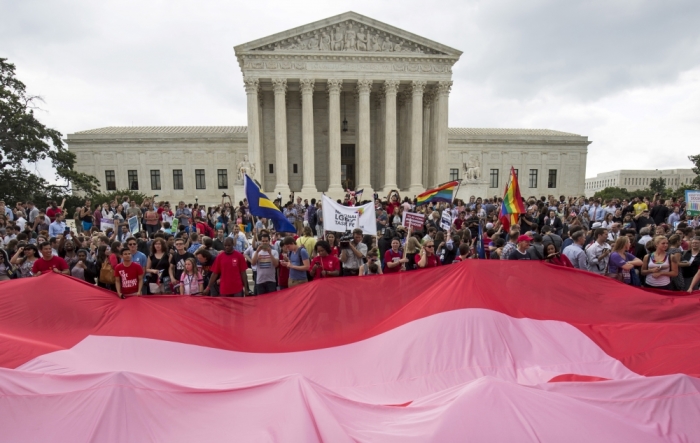Religious Conservatives Will Be Vilified and Marginalized, Lose Their Religious Freedom, Justices Warn in Gay Marriage Dissenting Opinions

Friday's Supreme Court decision redefining marriage in all 50 states to include same-sex couples will infringe upon the religious freedoms of those holding traditional views about marriage, dissenting justices warned.
While religious accommodations have been written into state laws redefining marriage, the U.S. Supreme Court did not, and could not, do that in claiming that gay marriage is a fundamental right; inevitably, this will lead to religious freedom conflicts, Chief Justice John Roberts wrote in his dissenting opinion.
"Unfortunately, people of faith can take no comfort in the treatment they receive from the majority today," he wrote. (For simplicity, footnotes have been removed from all quotes.)
While Justice Anthony Kennedy acknowledged in his majority opinion that religious conservatives have the right to "advocate" and "teach" their views, "ominously," Roberts continued, there was no mention of the freedom to live according to their beliefs.
"The First Amendment guarantees, however, the freedom to 'exercise religion.' Ominously, that is not a word the majority uses," he wrote.
Justice Clarence Thomas also criticized Kennedy's opinion for "a misunderstanding of religious liberty in our nation's tradition."
"Religious liberty is about more than just the protection for 'religious organizations and persons ... as they seek to teach the principles that are so fulfilling and so central to their lives and faiths,'" he wrote. "Religious liberty is about freedom of action in matters of religion generally, and the scope of that liberty is directly correlated to the civil restraints placed upon religious practice."
Religious colleges and adoption agencies could lose their tax-exempt status for upholding norms consistent with their faith, Roberts noted, while citing the oral arguments of the Obama administration's solicitor general.
"Hard questions arise when people of faith exercise religion in ways that may be seen to conflict with the new right to same-sex marriage — when, for example, a religious college provides married student housing only to opposite-sex married couples, or a religious adoption agency declines to place children with same-sex married couples," he wrote.
Worse still, Roberts continued, Kennedy used language demeaning those who disagree with him, which will have consequences for their religious freedom.
"Perhaps the most discouraging aspect of today's decision is the extent to which the majority feels compelled to sully those on the other side of the debate.
"The majority offers a cursory assurance that it does not intend to disparage people who, as a matter of conscience, cannot accept same-sex marriage. That disclaimer is hard to square with the very next sentence, in which the majority explains that 'the necessary consequence' of laws codifying the traditional definition of marriage is to 'demea[n] or stigmatiz[e]' same-sex couples. The majority reiterates such characterizations over and over.
"By the majority's account, Americans who did nothing more than follow the understanding of marriage that has existed for our entire history — in particular, the tens of millions of people who voted to reaffirm their States' enduring definition of marriage — have acted to 'lock ... out,' 'disparage,' 'disrespect and subordinate,' and inflict '[d]ignitary wounds' upon their gay and lesbian neighbors.
"These apparent assaults on the character of fair minded people will have an effect, in society and in court. Moreover, they are entirely gratuitous. It is one thing for the majority to conclude that the Constitution protects a right to same-sex marriage; it is something else to portray everyone who does not share the majority's 'better informed understanding' as bigoted," he wrote.
Justice Samuel Alito also warned that the decision will be used to "vilify" and "marginalize" Americans who believe in traditional marriage. Comparing traditional marriage supporters to racists and misogynists will be particularly damaging.
"In the course of its opinion, the majority compares traditional marriage laws to laws that denied equal treatment for African-Americans and women. The implications of this analogy will be exploited by those who are determined to stamp out every vestige of dissent," he wrote.
Traditional marriage supporters will likely hold their views privately, fearing the dire consequences that could result from speaking out, Alito continued.
"I assume that those who cling to old beliefs will be able to whisper their thoughts in the recesses of their homes, but if they repeat those views in public, they will risk being labeled as bigots and treated as such by governments, employers, and schools," he wrote.
Like Roberts, Alito wrote that if the definition of marriage had been left to the states, the states could have included religious conscience protections, but taking that decision out of the hands of the deliberative lawmaking bodies means that contentious religious freedom battles lie ahead.
"By imposing its own views on the entire country, the majority facilitates the marginalization of the many Americans who have traditional ideas. Recalling the harsh treatment of gays and lesbians in the past, some may think that turnabout is fair play. But if that sentiment prevails, the Nation will experience bitter and lasting wounds," he wrote.




























